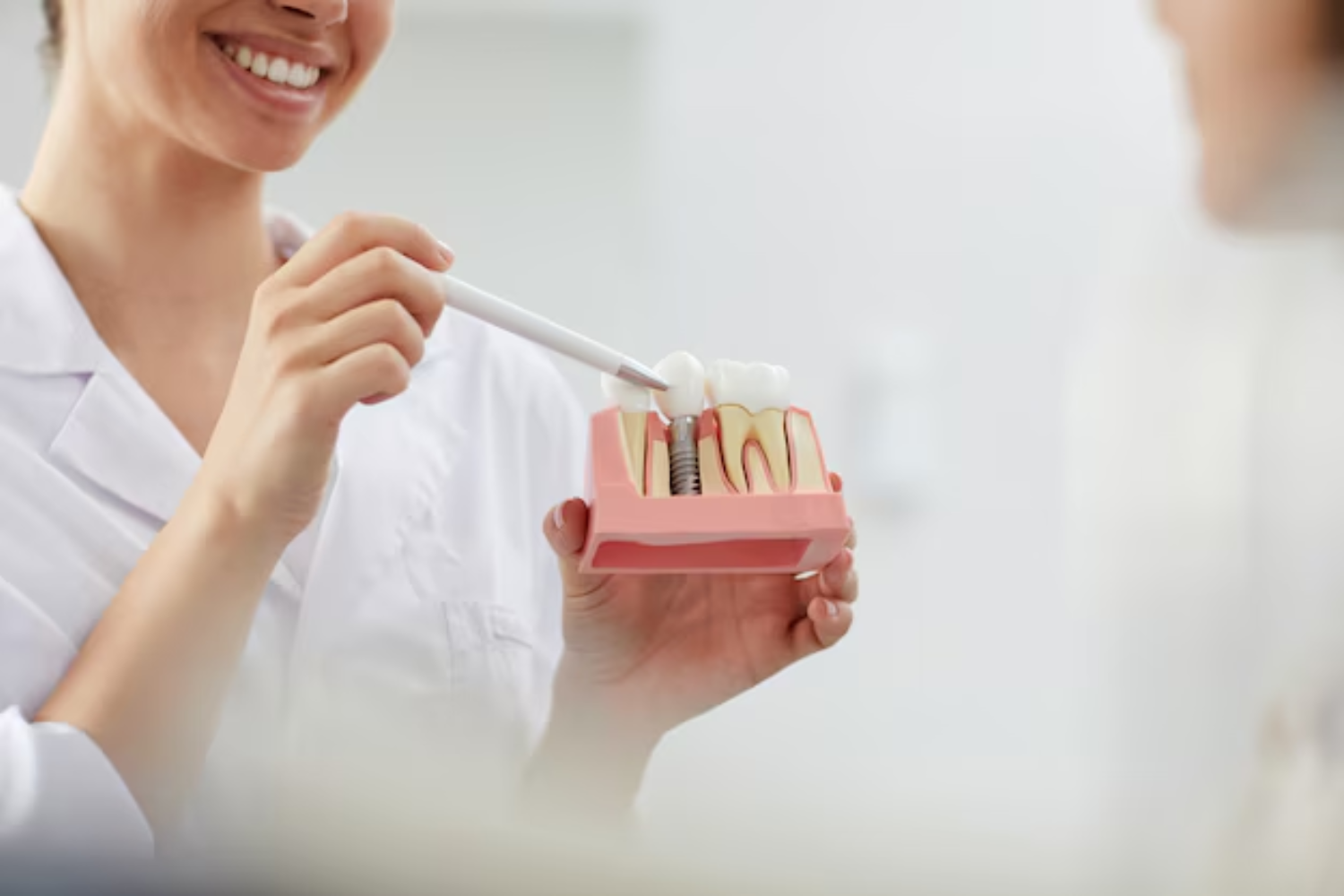Dental Implant Longevity: Ensuring Your New Smile Lasts

Dental implants are a transformative solution for missing teeth, providing a natural-looking and permanent replacement. However, like natural teeth, implants require proper care to ensure their longevity. Understanding how to maintain your dental implants can significantly impact their lifespan and the success of your smile restoration. In this blog, we’ll explore tips & tricks to ensure the longevity of dental implants in the long run.
Factors Affecting Implant Longevity
Various factors influence the longevity of dental implants, each playing a crucial role in the success and durability of the restoration. Understanding these factors can help you make informed decisions and ensure the longevity of your dental implants:
Oral Hygiene
Proper oral hygiene is paramount for the longevity of dental implants. Regular brushing and flossing help prevent plaque buildup, which can lead to gum disease and implant failure. Additionally, routine dental check-ups and cleanings are essential to detect any issues early on and maintain healthy gums.
Bone Density
Adequate bone density is necessary to support dental implants. Patients with insufficient bone density may require bone grafting procedures to strengthen the jawbone and provide a stable foundation for the implants. Your dentist will assess your bone density during the consultation process to determine the best course of action.
Smoking
Smoking is a significant risk factor for implant failure. It can impair the healing process and reduce blood flow to the gums, leading to complications. If you smoke, quitting can greatly improve the success rate and longevity of your dental implants. Your dentist can provide resources and support to help you quit smoking.
Health Conditions
Certain health conditions, such as diabetes and autoimmune diseases, can affect the integration of dental implants. It is important to disclose your complete medical history to your dentist to assess any potential risks and tailor the treatment plan accordingly. Managing these health conditions effectively can improve the chances of implant success.
Implant Care
Proper care and maintenance of dental implants are crucial for their longevity. Your dentist will provide specific instructions on how to care for your implants, including using a soft-bristle toothbrush and non-abrasive toothpaste to avoid damaging the implant and surrounding tissues. Additionally, avoiding hard foods and using a protective mouthguard if you grind your teeth can help protect your implants from damage.
Nutrition
A balanced diet rich in essential nutrients is vital for overall oral health and the longevity of dental implants. Nutrients like calcium, vitamin D, and phosphorus are particularly important for maintaining strong bones and supporting implant stability. Consult with a nutritionist or dietitian to ensure you are getting the necessary nutrients for optimal oral health.
Stress Management
Stress can have a negative impact on oral health, including the success of dental implants. Practicing stress-reducing techniques such as meditation, yoga, or mindfulness can improve overall health and potentially enhance the longevity of your implants.
Regular Follow-ups
Regular follow-up appointments with your dentist are essential to monitor the health of your implants and address any issues promptly. Your dentist will evaluate the stability of your implants and perform any necessary adjustments to ensure their longevity.
Ensuring Longevity
Ensuring the longevity of your dental implants requires a combination of proper care, regular maintenance, and healthy lifestyle choices. Here are some additional tips to help you maximize the lifespan of your implants:
Follow Post-Operative Instructions: After implant surgery, your dentist will provide specific instructions on how to care for your implants during the healing process. It’s crucial to follow these instructions carefully to prevent complications and promote proper healing.
Monitor Your Oral Health: Pay attention to any changes in your oral health, such as swelling, pain, or changes in the appearance of your implants. If you notice any issues, contact your dentist immediately for an evaluation.
Avoid Alcohol and Sugary Drinks: Consuming alcohol and sugary drinks can contribute to the buildup of plaque and bacteria around your implants, increasing the risk of infection. Opt for water or unsweetened beverages to maintain good oral health.
Use Fluoride Toothpaste: Brushing your teeth with fluoride toothpaste can help strengthen your natural teeth and protect your implants from decay. Use a soft-bristle toothbrush to avoid damaging the implant and surrounding tissues.
Consider Implant-Safe Foods: Some foods are more challenging for dental implants to handle, such as hard candies or sticky foods. Consider opting for softer foods to reduce the risk of damaging your implants.
Wear a Night Guard: If you grind your teeth at night, wearing a night guard can help protect your implants from damage caused by grinding and clenching.
Regular Exercise: Regular physical activity can improve circulation, which is beneficial for overall health and can contribute to the success of your dental implants.
The longevity of your dental implants is a result of diligent care, regular maintenance, and a commitment to your oral health. By following the tips outlined in this article and working closely with your dentist, you can ensure that your implants last a lifetime. If you have any concerns or questions about your dental implants, don’t hesitate to reach out to your dentist. They are your partners in maintaining a healthy smile and can provide personalized advice to help you make the most of your dental implant restoration.



